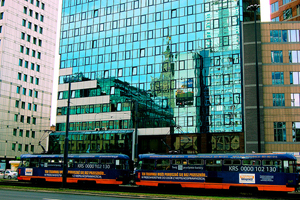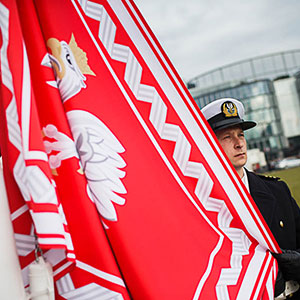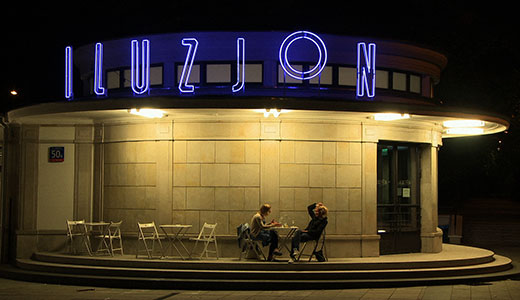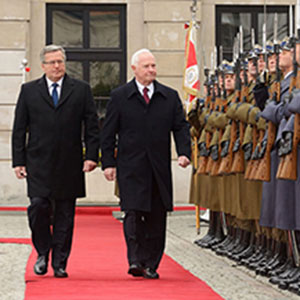 What can I say about Poland, after one month in Warsaw? That the Poles have become more American than the Americans? If not entirely accurate, like other facile observations, there’s a grain of truth here. Part of the reason is that Poles are doing well these days. Twenty years after the collapse of communism, capitalism is no longer a delightful novelty but rather the stable platform for economic growth and nation-building. Poland’s acceptance into the European Union – with its infusion of infrastructure-building capital – has accelerated this transformation.
What can I say about Poland, after one month in Warsaw? That the Poles have become more American than the Americans? If not entirely accurate, like other facile observations, there’s a grain of truth here. Part of the reason is that Poles are doing well these days. Twenty years after the collapse of communism, capitalism is no longer a delightful novelty but rather the stable platform for economic growth and nation-building. Poland’s acceptance into the European Union – with its infusion of infrastructure-building capital – has accelerated this transformation.
Prosperity is on glittering display the moment you step off the plane. Warsaw’s Chopin International Airport has been expanded and glamorized since my last visit here in 2006, with recessed track lighting and granite everywhere. The guards wave you through, no longer pausing to wonder what brings you here. Cars are ubiquitous and larger; the people, too, sport thicker waistlines and more fashionable threads; there’s a spring in Warsovians’ step, almost a cockiness. It used to be that Poles were impressed, even honored, to have Americans visit. Now you sense that they feel you’re lucky to meet them.
And they’re right. There’s something energizing about stepping away from an America in the doldrums to a Poland on the upswing. It would be hard to miss the fact that Poland is the only nation in Europe to be experiencing net positive economic growth this year during the global downturn. And last month, Poles excitedly noted that their country had climbed to No. 41 on the United Nations’ HDI (Human Development Index) quality-of-life rankings, just three spots shy of the first tier of nations. (This UN barometer looks beyond a nation’s gross domestic product to gauge a country’s broader definition of well-being, taking into account such factors as health and longevity; education and literacy; and standard of living. By comparison, the HDI puts Norway at No. 1, Canada at No. 4, and the U.S. at No. 13.)
But even without these statistics, personal observation tells the same story. Within a three-block radius of where I’m staying in the Bielany section of the city, a sizable new local government building has just opened, featuring modern lines and a granite façade and flooring. Dramatic renovations are being made to houses and apartment buildings and a public school down the block. A few blocks the other way, crews are digging the foundation for a major high-rise apartment building. And, just last month, another subway line – to go under the Vistula River connecting the Praga section – was green-lighted. Even the sidewalks are undergoing extensive renovation: being widened, improved and standardized. In the Mokotow section of the city, I noticed smart design on a wide, blocks-long swath of sidewalk which cleverly designates two thirds of its space for bicycles, the rest for foot traffic. (It even features a pedestrian “crosswalk” through the bicycle lane.)
In my new life in this city – where I plan to spend the next seven months of my sabbatical – I spend a great deal of time on the Metro and… in the mall. I bought myself and my son three-month transit passes, and though subway, trams and buses can be positively claustrophobic during rush hour, you can’t help but marvel at the efficiency and speed of the network. I’ve never once had to wait for a train. If you miss one, the next one comes in two minutes. (Trams clamber along a bit more slowly but make steady progress, all the more impressive when the streets are jammed with cars.) Though I miss the daily swims I enjoyed in North Carolina, walking everywhere helps compensate.
I’ve spent more time in malls in the last month here than in the last two years in the States. Not only do I buy necessities such as groceries and toiletries at the Galeria Mokotow near my son’s school, but I do banking and meet people in this public space. Last week, at the teller’s window at Citibank’s Polish partner, Bank Handlowy, I spotted a well-dressed black woman at the window next to mine, speaking English to the teller. I introduced myself, asking if she were American. She identified herself as the Angolan ambassador to Poland. We exchanged business cards, and she promised to invite me to her next reception.
A mall in Poland is not so different from one in the States; they’re filled with seductively displayed merchandise and teeming people, mostly the young and middle aged. You can’t help but worry about the effects of consumerism. Oddly, the day I arrived in Warsaw, a 21-year-old woman committed suicide here, apparently by throwing herself off an escalator at a mall. People thought it peculiar: where she chose to die. I don’t know the particulars, but Galerianki, the dark but popular, Polish-made movie now playing in the cinemas about teenage girls, who troll the malls trading sex for branded merchandise, could supply some answers – if not to this woman’s particulars to the culture that summoned her demise.
Polish intellectuals may be wary of consumerism’s reach, but my feeling is that the majority Poles aren’t yet ready for an American-style simplicity movement. And while Poles appear more rushed, hurried and, yes, even more crass than in my previous five trips here in the recent and distant past, they really don’t need the call to socially responsible behavior (especially coming from an American) quite so much as we westerners do. The details of life here tell you why. If you forget to bring your shopping bag to the supermarket, you have to pay for a plastic replacement. In their
homes, Poles routinely turn off the lights when they step out, and they all still hang their clothes on lines. When you see a Pole sitting in his car on the street, you can bet his engine is off; he wouldn’t think of wasting the gas and letting the engine idle to heat his feet or run his radio. At the newly renovated pool where my son and I swim, for showers, you have to depress the button which releases short bursts of coolish water, effectively curbing long showers. The list goes on.
The other things I’ve noticed is that Poles like us less than before. If Americans have fallen from our pedestal, it’s high time. When a wealthy Polish woman and I went for coffee one day to swap Polish-English practice, I learned that though she travels the world (Africa, South America, Asia), she has no interest in visiting America. “I’m afraid of driving on the highway, being stopped and patted down by the police,” she told me.
Though this Hollywood scenario is improbable, I guessed that some deeper meaning was at play. It is true is that Poles are irritated by an American visa policy by which they must apply for a tourist visa and pay a $100 application fee (with a certain percentage being rejected and losing their money in the process). These hoops have been dropped for Czechs and Estonians, but not the Poles. Not surprisingly, the Poles view this policy as discriminatory, thus driving a larger wedge between the America they have historically cherished and the America of today. America would be smart to revisit these policies and reach out to repair the damage. And if America would put on its listening cap, it might just learn a thing or two from this feisty nation which is undergoing a renaissance of historic proportions – a country on the move. That’s what I’m here to do.
CR
Imagery
Warszawa Aleja JP2 by Ahorcado used with a creative commons license



